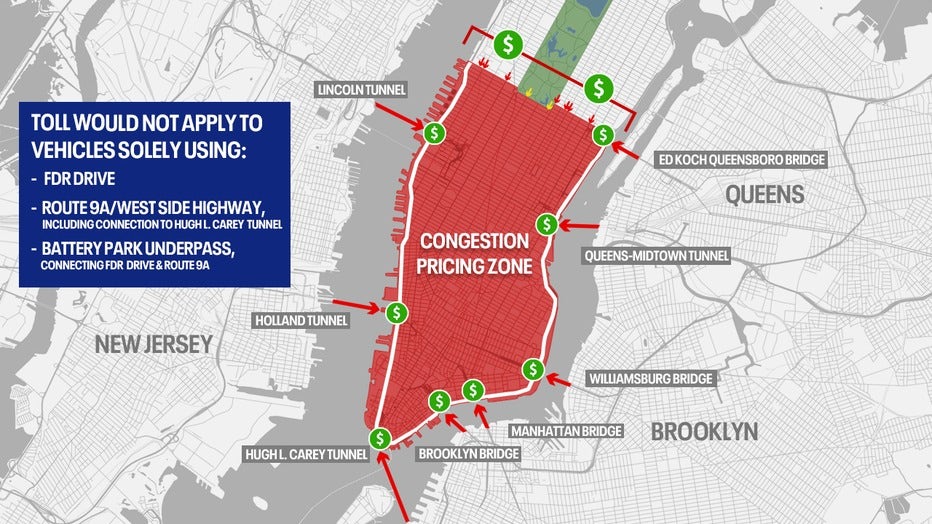How does congestion pricing work?

Hearing on NJ's effort to block congestion toll
New Jersey lawmakers are set to return to the courtroom to argue that New York City congestion pricing tolls will disproportionately harm state residents and families. FOX 5 NY's Hayley Fixler has the details.
NEW YORK - Congestion pricing is set to start on Sunday, Jan. 5, introducing higher commuting costs for many traveling in and around New York City.
The controversial plan, however, is still embroiled in legal battles, particularly from New Jersey opponents. On Friday, New Jersey lawmakers will head back to federal court in Newark, arguing that the tolls unfairly burden Garden State residents and their families.
State officials are also raising environmental concerns, claiming the policy will increase traffic as drivers try to dodge fees for entering Manhattan south of 60th Street.
The program, designed to cut down on gridlock and pollution while generating revenue for public transit, remains a priority for Gov. Kathy Hochul, who reaffirmed her commitment to moving forward earlier this week.
Meanwhile, the MTA dismissed the ongoing lawsuits as "the height of hypocrisy," emphasizing their determination to implement the initiative.
Here’s a breakdown of what drivers need to know about congestion pricing and how it will work.
SKIP TO: COST | MAP | DISCOUNTS | WHAT IS CONGESTION PRICING?
What is congestion pricing?

NJ lawmakers fight to stop congestion pricing in its tracks
Randy Mastro argues that there is little in the plan that will benefit New Jersey at all although there will be many communities in the Garden State that will be impacted.
Congestion pricing is aimed at reducing traffic and pollution while encouraging the use of public transit. It has long existed in other cities around the globe, including London, Stockholm, Milan and Singapore, but not in the U.S.
The MTA plans to use toll revenue to modernize the city’s transit system. However, Queens drivers feel the immediate impact of the toll will disproportionately affect them, which rely heavily on the Queens Midtown Tunnel and the Queensboro Bridge—both gateways to the congestion pricing zone.
The MTA says the toll revenue will help modernize transit across the city.
Featured
NYC's congestion pricing begins January 5: Which drivers are eligible for discounts?
Some drivers could qualify for a discount that reduces the congestion toll by 50%, while drivers with disabilities or health conditions that prevent them from using mass transit could apply for a "disability exemption."
Congestion pricing discounts
Some exceptions include a free pass for emergency vehicles, specialized city vehicles, and buses with regular public routes or city school contracts.
Vehicles carrying disabled people and certain low-income commuters also get a pass. Low-income drivers are eligible for discounts and tax credits.
When is congestion pricing?
Drivers will see the highest tolls between 5 a.m. to 9 p.m. on weekdays and 9 a.m. to 9 p.m. on weekends. Tolls will be 75% cheaper outside of peak hours.
Congestion pricing map
Vehicles entering the Manhattan zone, which are local streets and avenues at or below 60 Street – near Central Park – will be charged a toll.

Drivers on the FDR and West Side Highway passing through the borough will not be charged.
How much does congestion pricing cost?
Under the congestion pricing plan, drivers heading into Manhattan below 60th Street will pay an estimated $9 toll per trip. For those traveling through Port Authority crossings, an additional $16 toll applies. Even with a crossing credit, the daily cost will hover around $22—roughly $5,700 annually, not including gas and other expenses.
What if I take a taxi or Uber?
Passengers in taxis and for-hire vehicles will have a per-trip surcharge added to their fares for rides to, from, within or through what is known as the Congestion Relief Zone. That charge is 75 cents for people taking taxis, green cabs and black cars, and $1.50 for Uber or Lyft passengers.
Meanwhile, Randy Mastro, attorney for the state of New Jersey, interpreted the ruling differently, asserting that congestion pricing is effectively on hold pending further clarification from federal officials.
"The judge has ordered a remand and the MTA therefore cannot proceed with implementing the current congestion pricing proposal," Mastro said.
Featured
2025 commuter price hikes: What subway, tolls, buses, Citi Bike will cost
With subway fares inching closer to $3, higher Citi Bike fees, and substantial tolls for drivers, 2025 is shaping up to be a costly year for commuters.
Republican New York City Council member Joseph Borelli hailed the ruling as a win for opponents of congestion pricing.
"This is a win for the people that want to see congestion pricing paused nar removed from our lexicon and never talked about again," Borelli said.
President-elect Donald Trump has indicated that he intends to scrap congestion pricing once he takes office on January 20, a move that would be more complicated if the program is already implemented.



